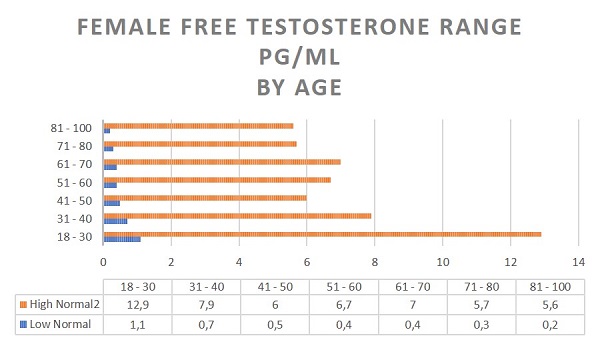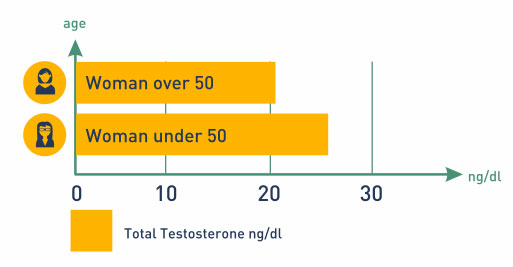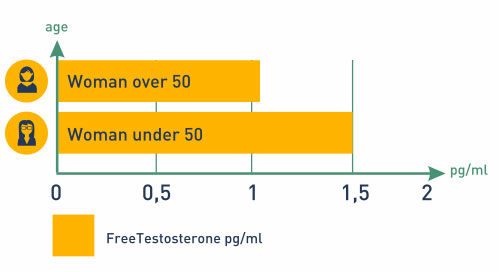Testosterone for Women: Why Hormone Balance Is Crucial
As crucial as it is to maintain healthy levels of estrogen and progesterone as you age, the need for adequate testosterone for women is just as vital. Along with its many other functions in the female body, testosterone is also the precursor hormone to estradiol – the leading form of estrogen in premenopausal women.
If the delicate balance of sex hormones (estrogen, progesterone, and testosterone) is altered in any way, critical physiological functions in the body can suffer. Whether too high or too low, abnormal testosterone levels can lead to significant health issues. Hormone replacement therapy (HRT) can help put these delicate chemical levels back in balance.
The use of prescription TRT – testosterone replacement therapy for women – can replenish low supplies of testosterone. Low testosterone (Low T) is the most common complaint of women as they age. High testosterone is more common earlier in life, and we see that often associated with polycystic ovarian syndrome (PCOS).
In this look at the use of testosterone hormone therapy for women, we will cover the following topics:
- Why women need testosterone
- Standard level of free and total testosterone in women
- Causes and signs of high and low testosterone
- Whether treatment is necessary for women with high or low testosterone
- Treatment options, including natural actions
Women’s bodies are quite different from those of men, and the need for testosterone is much lower. That is why traditional male-oriented treatments, such as injectable testosterone, is not recommended for women, except in certain situations.
What are the benefits of testosterone injections for women?
The benefits of testosterone for women for the use of injections include the treatment of certain types of metastatic breast cancer that cannot be treated with surgery.
Why Do Women Need Testosterone?
Testosterone is more than just a sex hormone. It carries out or assists in many functions in the human body. Without enough testosterone, a woman may find herself experiencing many changes in how she feels, looks, thinks, and acts.
What does testosterone do for a woman’s body?
Take a look below at some of the primary functions of testosterone:
-
Bones and Muscles
On its own, as well as through conversion to estradiol, testosterone acts on osteoblasts and osteoclasts – bone cells that form new bone and those that regulate old bone cell resorption. Testosterone helps maintain bone mineral density.
On muscles, testosterone helps retain the nitrogen that aids in the development and maintenance of lean muscle mass. Low testosterone is often a cause of muscle and strength loss in aging adults.
-
Heart Health
Testosterone stimulates red blood cell production in bone marrow, which prevents anemia and supports healthy circulation. Testosterone also helps support normal cholesterol and triglyceride levels and reduces the risk of cardiovascular disease.
-
Metabolism
Metabolic syndrome is a considerable concern for women with low testosterone levels. Abnormal testosterone to estrogen ratio often results in fat retention, which increases aromatase activity in the body. Aromatase converts free testosterone into estradiol, resulting in higher estrogen levels that can lead to weight gain.
As testosterone levels decline, women may experience insulin resistance, lower HDL cholesterol and higher LDL cholesterol levels, and impaired glucose tolerance. As a benefit of testosterone for women, weight loss helps to improve the testosterone to estrogen ratio, lipid profile, and insulin sensitivity.
-
Brain Functions
Testosterone functions on androgen receptors in the brain that perform many actions, including:
- visual memory
- neuronal cell growth
- learning
- cognitive functions
- emotional behavior
- preventing amyloid plaque buildup (associated with Alzheimer’s disease)
-
Sleep and Energy
As testosterone levels decline, cortisol levels in the body tend to rise. Cortisol is the stress hormone, secreted during times of acute stress. However, for individuals who are always in a state of stress, cortisol levels remain high. The resulting action decreases sleep, leading to a loss of energy and frequent fatigue. Cortisol opposes testosterone, keeping its levels lower.
-
Libido and Sexual Functions
Preserving testosterone for women’s libido is crucial as low testosterone levels can decrease sexual thoughts, fantasies, and desires. Not only does testosterone help maintain vaginal secretions for pleasurable sex, but it also plays a significant role in ovarian functions and oocyte maturation. Women of child-bearing age may have a difficult time conceiving if they have low levels of testosterone.
How is testosterone good for women’s health?
As shown above, testosterone has significant benefits for keeping the heart, metabolism, and brain working properly. Normalized testosterone levels help reduce the risk of developing the following medical conditions:
- Osteoporosis
- Dementia
- Cardiovascular disease
- Type 2 diabetes
- Atherosclerosis
- Obesity
- Depression
What Is a Standard Testosterone Level for Women?
The level of testosterone for women is significantly lower than that for men. That does not make it any less important to maintain. The two primary measurements for testosterone are free and total levels. Free testosterone is the small amount unattached to one of the two proteins that transport testosterone through the bloodstream to the waiting androgen receptors. Total testosterone is the sum of all testosterone – both that which is free and unattached and that which is bound to either albumin or sex hormone-binding globulin (SHBG).
The charts below show the levels of free and total testosterone for women:
-
Total Testosterone
Normal Total Testosterone 30 – 95 ng/dL Low Testosterone Levels in Women Under at 50 Less than 25 ng/dL Low Testosterone Levels in Women Over at 50 Less than 20 ng/dL Female Testosterone LevelsNormal Total Testosterone30 – 95 ng/dLLow Testosterone Levels in Women Under at 50Less than 25 ng/dLLow Testosterone Levels in Women Over at 50Less than 20 ng/dL
-
Free Testosterone
Hormone doctors will order a blood testosterone test for women with signs of either low or high testosterone levels.
Causes and Signs of High Testosterone in Women
The production of testosterone for women occurs primarily in the ovaries and the adrenal glands. Cholesterol, which the body synthesizes first into pregnenolone before a series of enzyme activities and hormone conversions, leads to the secretion of testosterone. Certain types of hormonal disorders, diseases, and even actions taken by a female can lead to high levels of testosterone.
Possible causes of high testosterone in women include:
- Polycystic ovarian syndrome – In PCOS, a woman experiences an excess of androgen hormones. In turn, the ovaries may not function properly, increasing testosterone secretion. PCOS can also influence insulin levels, which can cause the ovaries to produce extra testosterone.
- Congenital adrenal hyperplasia – CAH affects the adrenal glands, which produce DHEA, testosterone, cortisol, and aldosterone. In women who have CAH, an absence of a crucial enzyme that regulates hormone production results in reduced cortisol and increased testosterone secretion.
- Hirsutism – A condition associated with increased testosterone production of androgen sensitivity of the hair follicles. PCOS, Cushing’s syndrome, late-onset adrenal hyperplasia, and tumors could cause Hirsutism and high testosterone levels.
- Steroid use – women who use anabolic steroids run a significant risk of increasing testosterone levels too high.
The signs of high testosterone are often cause-specific, but generally include the following:
- Increased facial hair
- Deepening of the voice
- Severe acne
- Rapid childhood growth by short adult height (CAH-specific)
- Enlarged clitoris
- Oily skin
- Excess body hair
- Absent or irregular periods
- Enlarged ovaries but lack of regular ovulation (PCOS-specific)
- Male pattern balding
- Increased lean muscle mass
- Reduced breast size
PCOS complications include miscarriage, infertility, obesity, type 2 diabetes, and endometrial cancer, which is why diagnosis and treatment are vital.
Elevated levels of testosterone in older women have also been associated with metabolic syndrome, insulin resistance, and cardiovascular disease. Identification and treatment of high testosterone is crucial to reduce these risks.
Causes and Signs of Low Testosterone in Women
Low levels of testosterone for women are a significant cause of concern as they can lead to many health risks and reduce quality of life.
Causes of low testosterone in women include:
- Reduced testosterone production associated with aging and menopause
- Oral estrogen
- Problems with adrenal gland, pituitary gland, or ovarian functions
- Being overweight as belly fat produces the enzyme aromatase with converts testosterone into estradiol
- High levels of stress which increase cortisol production that opposes testosterone
- Poor sleep resulting in reduced time for the body to produce testosterone
- Lack of exercise which can stimulate daytime testosterone release
The signs of low testosterone in women include:
- Weight gain
- Vaginal dryness
- Low libido
- Muscle and strength loss
- Joint pains
- Height shrinkage
- Reduced bone density
- Depression
- Forgetfulness
- Impaired cognitive functions
- Stress
- Lack of focus
- Insomnia
- Thinning or loss of hair
- Mood swings
- High cholesterol
- Anemia
- Heart problems
- Fatigue
Ongoing low testosterone levels can lead to obesity, type 2 diabetes, cardiovascular disease, osteoporosis, dementia, and other health concerns.
Do Women Need to Be Treated for Abnormal Testosterone Levels?
The use of testosterone HRT for women can make a tremendous difference on overall quality of life. Treatment depends on many factors, including blood test results, physical examination findings, and symptom severity.
-
Treatment for High Testosterone
The doctor will first look at the cause of high testosterone when determining the appropriate treatment. In some cases, lifestyle changes, such as losing weight and increasing exercise, may help. Women with increased hair growth may opt to bleach or shave the excess hair or turn to laser hair removal. Special cleansers and lotions may help reduce oily skin and acne.
The following medications can help treat high testosterone levels:
- Oral contraceptives
- Glucocorticosteroids
- Spironolactone
- Metformin
-
Treatment for Low Testosterone
The use of prescription testosterone for women in the form of a custom compounded cream is a safe and effective way to increase low testosterone levels. The doctor will determine the precise testosterone dosage for women based on their blood test results and medical review.
Can You Treat Abnormal Testosterone Levels Naturally?
Because maintaining healthy levels of testosterone for women’s health is crucial at every age, taking some natural steps as early in adulthood as possible can be extremely beneficial.
Here are the things you can do to help keep your hormone levels in balance:
- Optimize your hormone production through proper sleep – getting between seven and nine hours a night is crucial
- Reduce stress to keep testosterone and cortisol levels in balance
- Get exercise during the day to maximize hormone production
- Keep weight in check as being overweight can create a hormonal imbalance
How to Get Treatment for Abnormal Testosterone Levels
If you require testosterone replacement for women to treat low levels, or a medication to reduce high testosterone levels, our doctors can help determine your needs. Here at National HRT, we help women and men return their hormone levels to a state of balance.
With customized testosterone therapy for women, the many symptoms and health risks associated with low testosterone are easily rectified.
When you contact National HRT to inquire about getting the best testosterone for women, you will begin with a free, confidential consultation by phone.
Following that, you will complete a blood test, physical examination, and medical history form. Our hormone specialists can then determine the appropriate treatment for your needs.
Contact us today for your free consultation.






